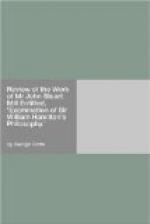From hence Mr Mill (chap. iv.) proceeds to criticise at considerable length what he justly denominates the celebrated and striking review of Cousin’s philosophy, which forms the first paper in Sir W. Hamilton’s ‘Discussions on Philosophy.’ According to Mr Mill—
’The question really at issue is this: Have we or have we not an immediate intuition of God? The name of God is veiled under two extremely abstract phrases, “The Infinite and the Absolute,” perhaps from a reverential feeling; such, at least, is the reason given by Sir W. Hamilton’s disciple, Mr Mansel, for preferring the more vague expressions; but it is one of the most unquestionable of all logical maxims, that the meaning of the abstract must be sought for in the concrete, and not conversely; and we shall see, both in the case of Sir William Hamilton, and of Mr Mansel, that the process cannot be reversed with impunity.’—p. 32.
Upon this we must remark, that though the ‘logical maxim’ here laid down by Mr Mill may be generally sound, we think the application of it inconvenient in the present case. Discussions on points of philosophy are best conducted without either invoking or offending religious feeling. M. Cousin maintains that we have a direct intuition of the Infinite and the Absolute: Sir W. Hamilton denies that we have. Upon this point Mr Mill sides entirely with Sir W. Hamilton, and considers ’that the latter has rendered good service to philosophy by refuting M. Cousin,’ though much of the reasoning employed in such refutation seems to Mr Mill unsound. But Sir W. Hamilton goes further, and affirms that we have no faculties capable of apprehending the Infinite and the Absolute—that both of them are inconceivable to us, and by consequence unknowable. Herein Mr Mill is opposed to him, and controverts his doctrine in an elaborate argument.
Of this argument, able and ingenious, like all those in the present volume, our limits only enable us to give a brief appreciation. In so far as Mr Mill controverts Sir W. Hamilton, we think him perfectly successful, though there are some points in his reasoning in which we do not fully concur.
In our opinion, as in his, the Absolute alone (in its sense as opposed to relative) can be necessarily unknowable, inconceivable, incogitable. Nothing which falls under the condition of relativity can be declared to be so. The structure of our minds renders us capable of knowing everything which is relative, though there are many such things which we have no evidence, nor shall ever get evidence, to enable us to know. Now the Infinite falls within the conditions of relativity, as indeed Sir W. Hamilton himself admits, when he intimates (p. 58) that though it cannot be known, it is, must be, and ought to be, believed by us, according to the marked distinction which he draws between belief and knowledge. We agree with Mr Mill in the opinion that it is thinkable, conceivable, knowable. Doubtless we do not conceive it adequately, but we conceive it sufficiently to discuss and reason upon it intelligibly to ourselves and others. That we conceive the Infinite inadequately, is not to be held as proof that we do not conceive it at all; for in regard to finite things also, we conceive the greater number of them only inadequately.




